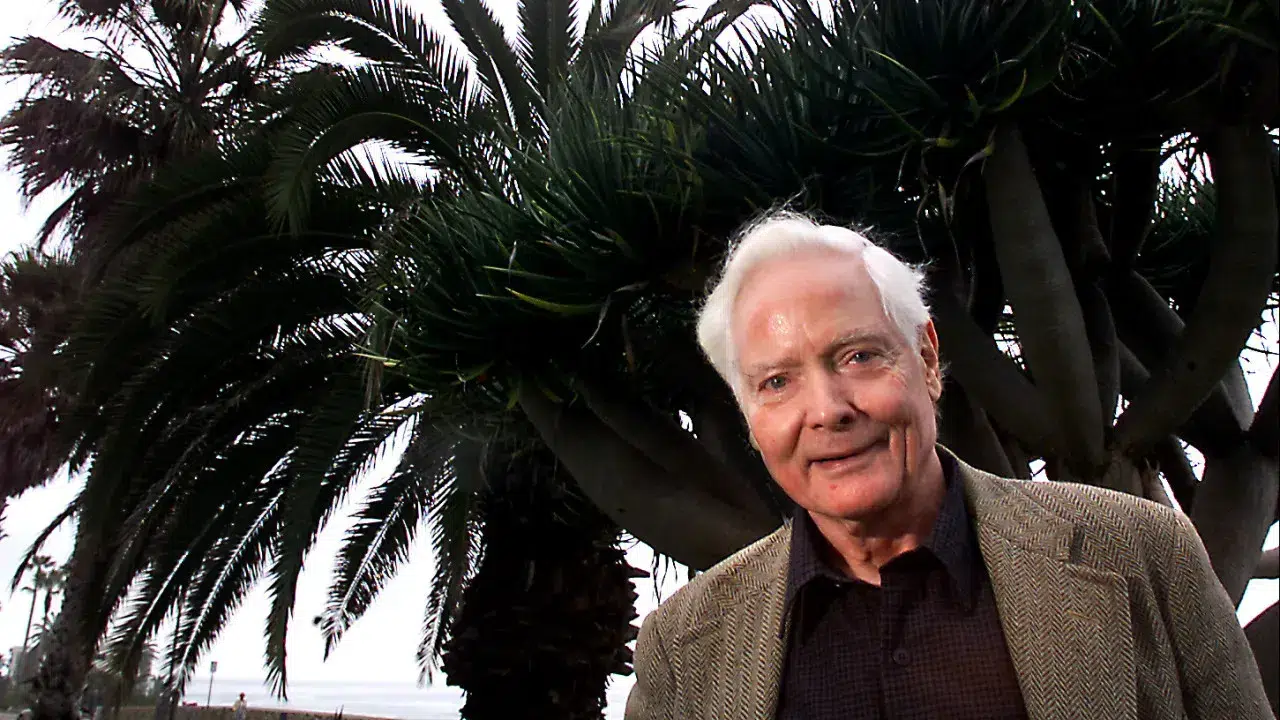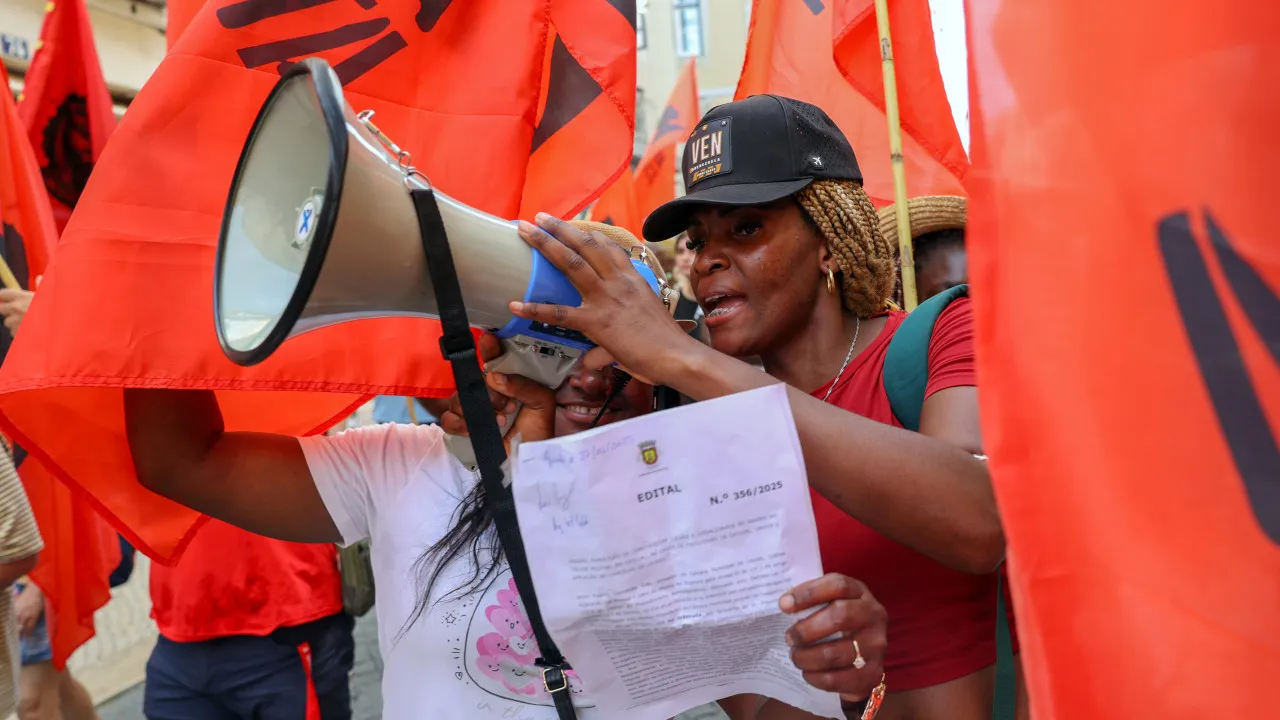
Curated by poet and translator Jorge Sousa Braga, ‘Lamento por uma pedra e outros poemas’, a bilingual edition, showcases over 60 years of literary production by W.S. Merwin (1927-2019).
The work draws from 17 of Merwin’s celebrated books, including his early works like ‘The Dancing Bears’ (1954) and ‘Green with Beasts’ (1956), his final book ‘Garden Time’ (2016), and renowned titles such as ‘Travels’ (1994) and ‘The River Sound’ (1999). It also features Pulitzer Prize-winning titles ‘The Carrier of Ladders’ (1970) and ‘The Shadow of Sirius’ (2009).
This newly published anthology includes poems translated by Jorge Sousa Braga for the digital magazine Torpor from publisher Abysmo in 2020, and ‘Como levantar uma árvore’ for Flâneur in 2023.
Described as “one of the most important English-speaking poets of our time” and “one of the most innovative of recent decades,” the anthology highlights Merwin’s expertise as a translator, his strong ecological and anti-war stance, his passion for Eastern culture, and his cultivation of a new and unencumbered poetry style.
Merwin translated classics by Euripides, Dante, and Sá de Miranda, authors such as García Lorca, Neruda, Borges, Brodsky, Mandelstam, and João Cabral de Mello Neto. He wrote about Fernando Pessoa and lived in Portugal, France, London, and Chiapas, Mexico. He interacted with Robert Lowell, T.S. Eliot, Sylvia Plath, and Ted Hughes during his travels.
As a citizen, Merwin opposed the Vietnam War and supported liberation movements in Africa. He was passionate about gardening and played a role in forest restoration.
In February 1962, a year after the start of the Angolan war, he opposed the “cynical and brutal” violence of the Salazar dictatorship and Portuguese colonial power over African peoples in the magazine The Nation, in the context of translating the poems of Agostinho Neto, then imprisoned in Luanda.
William Stanley Merwin was born in New York City on September 30, 1927, and grew up in New Jersey and Pennsylvania. The son of a Presbyterian minister, hymns enabled him to pen his first poems as a child.
In 1944, he entered Princeton University, where his tutors included critic R.P. Blackmur and poet John Berryman. He befriended poet Galway Kinnell and pianist Charles Rosen.
His literary heroes included Wallace Stevens, Ezra Pound, John Milton, and Percy Shelley, notes Sousa Braga in the “short biobibliographical note” at the beginning of the anthology.
An advocate of non-violence, Merwin was hospitalized in a psychiatric unit after regretting his enlistment at the end of World War II. Released as unfit for military service, he returned to Princeton and graduated in 1947, reading a poem to absent classmates killed in the conflict.
That year, he visited Ezra Pound, also hospitalized after a treason trial. Pound gave him lifelong poetic advice: translate the troubadours—’Read the seeds, not the branches.’
He did so, delving into Occitania’s tradition, translating ‘The Song of Roland’ into English, and the works of Portuguese troubadours Pero Moego, João de Guilhade, and Nuno Fernandes Torneol.
In the late 1940s, work as a tutor took him to the Portuguese royal family. He settled at the Serpins estate in Lousã in 1949, an experience he recounted in his memoir ‘Summer Doorways’ (2006), describing visits to Coimbra.
“There were hardly any cars, just some rickety trucks […]. Repeatedly, as I walked along the echoing cobblestone back streets, it hit me with a rush that I was in Europe, in Europe— a fact as palpable as the donkeys and knife grinders [around], as certain as my disastrous muteness in the language, but as hard to believe as if I had discovered I was fleeing.”
Europe was his literary territory. In 1950, he settled in Majorca, as tutor to Robert Graves’s son, the author of ‘I, Claudius’.
His editorial debut was in 1952 with ‘A Mask for Janus’, selected by W.H. Auden for the Yale Series of Younger Poets.
In subsequent years, he lived in London and southern France. In 1956, he returned to the United States with a grant from the Cambridge, Massachusetts Poets’ Theater.
Here, he dedicated himself exclusively to poetry, publishing ‘Green with Beasts’ and ‘The Drunk in the Furnace’ (1960), which foretold a stylistic and thematic shift. The New York Times highlighted the “rawness, humanity, and urgency” of his writing during this period.
In the 1960s, with ‘The Moving Target’ (1963) and ‘The Lice’ (1967), open forms and metric irregularity emerged. Merwin developed the characteristic line chaining and syntactic suspension that allowed him to dispense with punctuation.
His refinement was achieved in ‘The Carrier of Ladders’, which garnered his first Pulitzer Prize for Poetry. Merwin donated the prize money to anti-Vietnam War movements.
In 1976, he moved to Hawaii, where he lived until his death in 2019 and began restoring the tropical forest through his foundation, Merwin Conservancy.
In later works such as ‘The Compass Flower’ (1977), ‘Opening the Hand’ (1983), and ‘The Rain and the Trees’ (1988), his poems increasingly emphasized the natural world.
With 30 books of poetry within a bibliography of over 50 titles, including narrative, theater, and memoirs, W.S. Merwin’s career received repeated accolades: ‘Migration’ (2005) earned him the National Book Award, ‘Travels’ (1993) the Lenore Marshall Prize, and ‘Selected Translations’ (2013), expanded over a lifetime since 1968, the Harold Morton Prize.
Merwin was “the poet who planted palm trees,” writes Jorge Sousa Braga, in a literal and figurative sense, in the opening of ‘Lamento por uma pedra’. He quotes the writer: “On the last day of the world/ I would want to plant a tree/ not for the fruit/ […] I want the tree that stands in the ground for the first time.”




